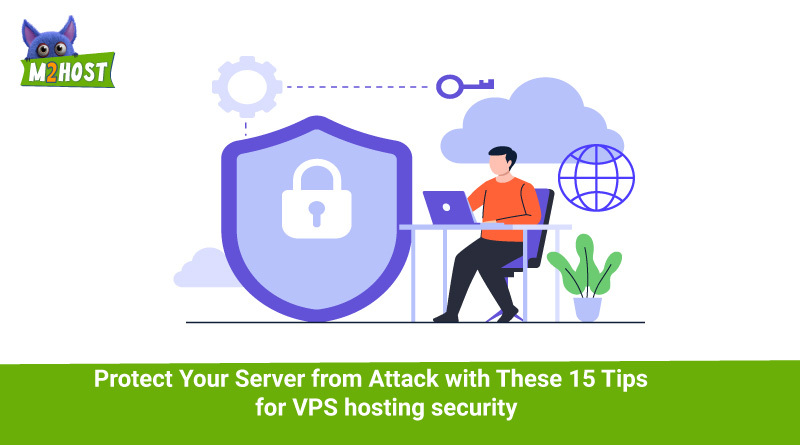VPS is the best web hosting option because of its strength and flexibility. However, cyber threats are a looming black cloud.
A poorly secured virtual private server (VPS) is like a ticking time bomb, waiting to destroy your finances, reputation, and customer base. You should harden your VPS for various reasons. Learning the configurations, procedures, and settings required to maintain server security is part of the best practices for VPS security. You will also have to constantly update your software tools to keep your server secure.
Everyone using the server has an impact on its security. Because of this, it’s critical to remember that every administrator using the VPS is accountable for its security.
In this article, we discuss VPS security tips. These tips are easy to use and highly effective, and they will transform your server from susceptible to secure.

Security Flaws in VPS security and Common Issues-
VPS security has flaws despite its overall strength. Numerous cyber threats may jeopardize the security and data of your VPS server. The most popular ones are as follows:
- Malware: It is invasive software that is purposefully created to damage computers and the operating systems on them. It can take many different forms, including as spyware, viruses, ransomware.
- Sniffing attack: This type of cyberattack occurs when a hacker utilizes packet sniffers to gather information from a network and intercept it.
- Brute-force attack: This type of hacking involves the attacker guessing login credentials through trial and error.
- SQL injection: This type of attack happens when a hacker uses a web application’s code to access the database on the server.
- Cross-site scripting (XSS): One client-side attack where malicious code is injected into a website by a hacker is called cross-site scripting (XSS).
- Lack of function-level control: This occurs when a server’s access rights are improperly validated and unapproved users are granted root access.
- Broken authentication: Identity theft resulting from improperly configured application session timeouts, weak passwords, or unprotected data.
Discover the essential components you should keep an eye on in your virtual private server before putting any security measures in place. These components include:
- SSH connection;
- Server software;
- VPN hosting security
- Logins and access to root
- Firewalls;
- credentials and passwords;
- FTP connection
- Server logs;
- User rights and privileges
15 VPS security tips to safeguard VPS server security –
Technology has given companies the means to grow and run more effectively, but it has also made sophisticated cyber threats easier to access. Unwavering protection is necessary for your server, which is the foundation of your online presence.
In addition to being a technological error, a breach in online safety can result in a loss of trust, damage to one’s reputation, and even financial loss. Which pre-emptive actions are necessary to protect your server—an unbreakable fortress—from online attacks?
- Use Stronger Passwords
Simple passwords with details about your identity are simple to decipher. To thwart successful brute-force attacks, make a lengthy, complex password with several characters, including digits and special characters.
Tools make it easy to create and store strong passwords. These tools offer a range of customization choices, including character and password length limitations.
Remember to update your password regularly—ideally once every three months—and avoid using the same one for many accounts. Additionally, to avoid unauthorized server changes, do not provide login credentials for users with root rights.
- Evaluate the Security of Your Web Hosting
To keep your server safe, your VPS hosting company needs to have a robust security infrastructure and give extra security. Although users can install additional security mechanisms, some are pre-configured.
The security elements vary depending on the provider.
- Turn off root logins
Users with root logins have the most access to the server. Anyone can make whatever changes they want by logging in as “root,” which is obviously extremely risky. Administrators should utilize a non-root user account with the required permissions, switching to a root user when needed.
They can reduce the attack surface by turning off direct root logins.
A data breach occurred at Dropbox once when an employee used a password from a compromised website.
- Keep an eye on your server logs
All actions on your best VPS server are documented in logs. Monitoring your logs on a regular basis enables you to identify odd trends or possible security breaches. Early discovery can make the difference between dealing with a full-blown catastrophe and stopping a hacking attempt.
- Modify the SSH port by default and begin utilizing SSH keys
Secure shell (SSH) is often used to gain safe access to servers. Nonetheless, port 22 is frequently the target of attackers. Changing this to a non-standard port will help you evade many automated assault attempts.
Furthermore, security is strengthened by substituting cryptographic keys, or SSH keys, for passwords. Because of the complexity of SSH keys, even the toughest passwords cannot be cracked. Major companies encourage the use of SSH keys for authentication.
- Reduce unnecessary modules and packages
Not all of the pre-installed software modules or packages are required for your operations, and each one has the potential to expose vulnerabilities. Removing outdated or unneeded packages lowers the total number of potential points of entry.
- Install an antivirus program
Despite being commended for having strong security, Linux is not impervious to attacks.
To protect your data and prevent compromise, install antivirus software on your VPS server to enhance VPS security. Similar to software that has prevented malware from infecting millions of machines globally by identifying risks in real-time, an antivirus program for your server regularly checks files and processes.
- Make frequent backups
By regularly backing up your data, you may prevent such catastrophes for your cheap VPS server. In the event of a data loss catastrophe, you can restore everything to its previous state by keeping backups.
- Deactivate IPv6
The most recent version of the Internet protocol, IPv6, can be disabled to prevent potential vulnerabilities and threats. However, if it needs to be set up and secured correctly, it may also introduce additional hazards.
Disabling IPv6 reduces the attack surface and potential exposure to cyber threats. However, it’s crucial to be aware that an incorrect IPv6 setup can also introduce additional security hazards.
- Turn off unused ports
Cyberattacks can enter through any VPS port. Disabling unused ports closes unneeded doors is the VPS security tip to hinders intruders. Unused ports are disabled to reduce human error.
- Implement a firewall
The bouncer for your server is your firewall. It verifies every piece of data that enters and leaves. Firewalls can filter out undesired IP addresses or questionable requests with the correct rules and regulations in place.
- Deploy a malware scanner
An antivirus program shields your virtual private server (VPS) from malware and viruses, but it might not be able to identify more recent threats, such as zero-day malware.
Combine antivirus software with a malware scanner to improve your VPS security. Because it refreshes the detection rule more quickly, this kind of software can identify more recent threats to your system.
- Study the rights of users
Ensure that your cheap VPS server is protected by the best web hosting service provider. Although we frequently scan the exterior of the hosting site for threats, the troublemaker may occasionally call from within.
It is possible to avoid potentially disastrous situations by routinely evaluating and upgrading user permissions.
- Make use of disk partitioning
Disk partitioning is the process of dividing your server’s hard drive into several independent portions so that, in the event that one partition experiences problems, the others continue to operate.
- Use SFTP, not FTP
The most popular protocol for file transfers used to be file transfer protocol (FTP); however, because FTP does not encrypt data, it is susceptible to spying. Then, in order to function similarly to FTP with the added benefit of data encryption, a secure file transfer protocol (SFTP) was created.
Consider the circumstances in which you send private client information or corporate data. SFTP is like sending a sealed, secure courier package, while FTP is like sending a postcard that can be read by anybody if it is intercepted.
How to address frequent security flaws in VPS?
Cyber dangers are frequently closer than you might imagine. Hackers may target even the smallest weaknesses in your systems. Identifying weak points and taking quick action strengthens the security of your best VPS server.
Look at these typical mistakes to find out how to avoid them.
- Weak passwords
A weak password is the favoured entry point for hackers. A study conducted by the National Cyber Security Centre in the UK found that 23.2 million victims had used “123456” as a password that was later compromised.
A staggering 81% of business data breaches are caused by weak or stolen passwords.
- Obsolete software
Operating with obsolete software is like having your doors unlocked. Like burglars who search for full mailboxes and overgrown lawns, cybercriminals are always on the lookout for known flaws in outdated versions.
- Unprotected ports
For hackers, an open port is similar to an unlocked door. For example, open ports led to the Redis database vulnerability.
- Improper authorization for users
Overprivileged individuals are a recipe for catastrophe. According to Accenture’s analysis of 500 firms’ quarterly reports, 37% of company hacks start with inside actors.
- Lack of supervision
Potential dangers can arise because abnormalities in server operations go unreported and unchecked.
Imagine an unexpected increase in traffic. Even though this could be a DDoS attack, if sufficient oversight isn’t in place, someone could easily mistake it for an unexpected spike in active users.
- No function-level control
Function-level control focuses on the particular actions a user can take rather than just granting them basic access.
Let’s say a worker in a business’s finance department can see and edit payroll information. If no boundaries are established, that employee may make mistakes, change things without permission, or even do bad things.
Conclusion-
A server that is not safeguarded might cause serious issues as cyber threats become more complex and frequent. You could lose crucial information and the trust that others have in you.
Maintaining a secure VPS server requires constant attention, much like gardening. By keeping informed and adhering to sound safety advice, you are constructing a formidable defense.
Also, remember that by protecting your server, you are demonstrating to your users your genuine concern for their trust.



